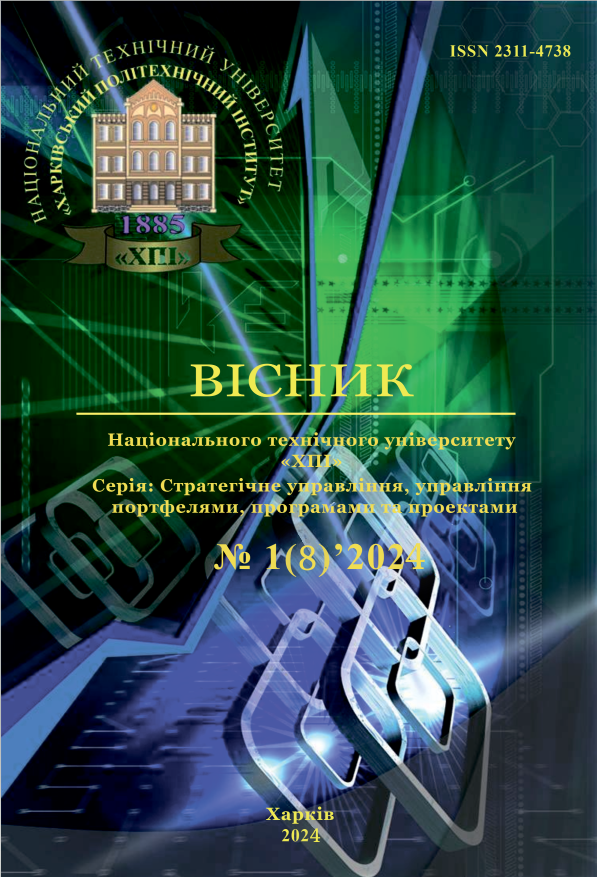STRATEGIC PROJECT MANAGEMENT DEVELOPMENT UNDER INFLUENCE OF ARTIFICIAL INTELLIGENCE
DOI:
https://doi.org/10.20998/2413-3000.2024.8.1Keywords:
strategic project management, development, artificial intelligenceAbstract
This paper explores the dynamic intersection of artificial intelligence (AI) and strategic project management (SPM), investigating the transformative effects of AI technologies on traditional project management practices. As organizations navigate an increasingly complex and fast-paced business environment, the integration of AI in SPM emerges as a catalyst for efficiency, adaptability, and informed decision-making. The study delves into key facets of SPM influenced by AI, including data-driven decision-making, predictive analytics, automation of routine tasks, and resource optimization. The role of AI in risk management, particularly in identifying, assessing, and mitigating project risks, is examined in detail. Furthermore, the paper explores how natural language processing (NLP) fosters enhanced communication within project teams, contributing to a more collaborative and connected working environment. Adaptive project planning, facilitated by AI, is investigated as a mechanism for responding to evolving project dynamics in real-time. The paper underscores the importance of continuous monitoring and reporting enabled by AI, providing project managers with timely insights for strategic adjustments. The concept of continuous improvement, driven by AI-driven analytics, is explored as organizations seek to refine and optimize their project management approaches based on past experiences. Ethical considerations and responsible AI practices are emphasized as integral components of AI integration in SPM. The paper concludes by highlighting the synergistic potential of human expertise and AI capabilities, envisioning a future where organizations can leverage AI to achieve more adaptive, efficient, and successful project outcomes. This comprehensive review aims to contribute to the understanding of AI's transformative influence on strategic project management, providing insights for practitioners, researchers, and organizations seeking to navigate the evolving landscape of project management in the era of artificial intelligence.
References
Huang, M., & Rust, R. (2020). A strategic framework for artificial intelligence in marketing. Journal of the Academy of Marketing Science, 49, 30-50. https://doi.org/10.1007/s11747-020-00749-9.
Moutinho, L., Curry, B., & Davies, F. (1993). Comparative Computer Approaches to Multi-Outlet Retail Site Location Decisions. Service Industries Journal, 13, 201-220. https://doi.org/10.1080/02642069300000069.
Keding, C. (2020). Understanding the interplay of artificial intelligence and strategic management: four decades of research in review. Management Review Quarterly, 71, 91-134. https://doi.org/10.1007/s11301-020-00181-x.
Holzmann, V., Zitter, D., & Peshkess, S. (2022). The Expectations of Project Managers from Artificial Intelligence: A Delphi Study. Project Management Journal, 53, 438 - 455. https://doi.org/10.1177/87569728211061779.
Fernández, J., Moreno, J., Vergara-González, E., & Iglesias, G. (2022). Bibliometric Analysis of the Application of Artificial Intelligence Techniques to the Management of Innovation Projects. Applied Sciences. https://doi.org/10.3390/app122211743.
O'Connor, R., & Jenkins, J. (1999). Using agents for distributed software project management. Proceedings. IEEE 8th International Workshops on Enabling Technologies: Infrastructure for Collaborative Enterprises (WET ICE'99), 54-60. https://doi.org/10.1109/ENABL.1999.805175.
Najdawi, A., & Shaheen, A. (2021). Which Project Management Methodology is better for AI-Transformation and Innovation Projects?. 2021 International Conference on Innovative Practices in Technology and Management (ICIPTM), 205-210. https://doi.org/10.1109/ICIPTM52218.2021.9388357.
Bushuyev, S., Bushuyeva, N., Bushuiev, D., & Bushuieva, V. (2022). PROJECT MANAGEMENT INTELLIGENCE ARCHITECTURE. Value co-creation in the project society. https://doi.org/10.56889/uxoz1111.
Downloads
Published
Issue
Section
License

This work is licensed under a Creative Commons Attribution-NonCommercial-ShareAlike 4.0 International License.
Our journal abides by the Creative Commons copyright rights and permissions for open access journals.
Authors who publish with this journal agree to the following terms:
Authors hold the copyright without restrictions and grant the journal right of first publication with the work simultaneously licensed under a Creative Commons Attribution-NonCommercial-ShareAlike 4.0 International License (CC BY-NC-SA 4.0) that allows others to share the work with an acknowledgement of the work's authorship and initial publication in this journal.
Authors are able to enter into separate, additional contractual arrangements for the non-commercial and non-exclusive distribution of the journal's published version of the work (e.g., post it to an institutional repository or publish it in a book), with an acknowledgement of its initial publication in this journal.
Authors are permitted and encouraged to post their published work online (e.g., in institutional repositories or on their website) as it can lead to productive exchanges, as well as earlier and greater citation of published work.

